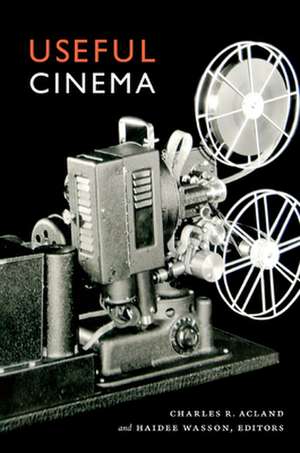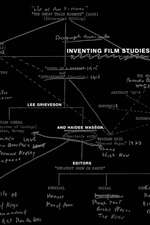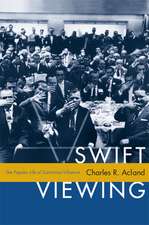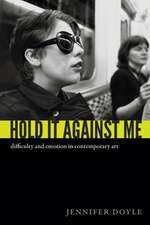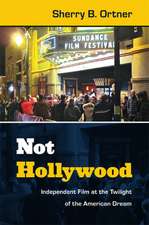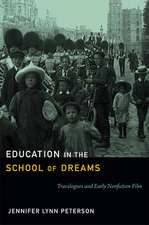Useful Cinema
Autor Charles R. Acland, Haidee Wassonen Limba Engleză Paperback – 13 oct 2011
Preț: 308.90 lei
Nou
Puncte Express: 463
Preț estimativ în valută:
59.11€ • 61.72$ • 48.81£
59.11€ • 61.72$ • 48.81£
Carte tipărită la comandă
Livrare economică 15-29 aprilie
Preluare comenzi: 021 569.72.76
Specificații
ISBN-13: 9780822350095
ISBN-10: 0822350092
Pagini: 400
Ilustrații: 56 illustrations
Dimensiuni: 158 x 236 x 26 mm
Greutate: 0.68 kg
Editura: MD – Duke University Press
ISBN-10: 0822350092
Pagini: 400
Ilustrații: 56 illustrations
Dimensiuni: 158 x 236 x 26 mm
Greutate: 0.68 kg
Editura: MD – Duke University Press
Cuprins
AcknowledgmentsIntroduction: Utility and Cinema / Haidee Wasson and Charles R. AclandPart I. Celluloid ClassroomsWhat a Power for Education!: The Cinema and Sites of Learning in the 1930s / Eric Smoodin; We Can See Ourselves as Others See Us: Women Workers and Western Unions Training Films in the 1920s / Stephen Groening; Hollywoods Educators: Mark May and Teaching Film Custodians / Charles R. Acland; UNESCO, Film, and Education: Mediating Postwar Paradigms of Communication / Zoë Druick; Health Films, Cold War, and the Production of Patriotic Audiences: The Body Fights Bacteria (1948) / Kirsten OstherrPart II. Civic CircuitsProjecting the Promise of 16mm, 193545 / Gregory A. Waller; A History Long Overdue: The Public Library and Motion Pictures / Jennifer Horne; Big, Fast Museums / Small, Slow Movies: Film, Scale, and the Art Museum / Haidee Wasson; Pastoral Exhibition: The YMCA Motion Picture Bureau and the Transition to 16mm, 192839 / Ronald Walter Greene; A Moving Picture of the Heavens: The Planetarium Space Show as Useful Cinema / Alison GriffithsPart III. Making Useful FilmsDouble Vision: World War II, Racial Uplift, and the All-American Newsreels Pedagogical Address / Joseph Clark; Mechanical Craftsmanship: Amateurs Making Practical Films / Charles Tepperman; Experimental Film as Useless Cinema / Michael ZrydFilmography; Bibliography; About the Contributors; Index
Recenzii
Often, in common understanding, education is seen as opposed to entertainment. But this rich and fascinating volume puts the lie to such assumption both by showing how, across the decades, useful cinema was measured in relation to Hollywood entertainment and indeed interacted with it in complex fashion and by doing so through essays that are themselves compelling and captivating, eloquent and enjoyable. It is itself, in other words, a masterful blend of the entertaining and the useful. - Dana Polan, New York University
This valuable book reveals how moving images proliferated beyond the spectacular confines of theaters to become deeply embedded in everyday life, cultures and institutions. The publication of this fascinating anthology is a welcome sign that cinema history is starting to forgo its longtime fascination with mass-produced glamour and making peace with its most utilitarian (and numerically dominant) genres. - Rick Prelinger, founder of Prelinger Archives
"Useful Cinema begins on the perfect point, with the observation that films today appear everywhere, from iPhone to Imax, from blog inserts to Jumbotrons, so becoming integral to our experience of institutional and everyday life. Thus the histories of the older cultural forms to be found in this interesting anthology are pitched not merely as worthwhile objects of rediscovery in their own right but also as enlightening precursors of the media surrounding and saturating the lives of modern readers....Useful Cinema can confidently be recommended to anyone interested in the intricacies of the relationship between the media and the society of the 20th century and those of the 21st." Patrick Russell, Reviews in History
"Often, in common understanding, education is seen as opposed to entertainment. But this rich and fascinating volume puts the lie to such assumption both by showing how, across the decades, 'useful' cinema was measured in relation to Hollywood entertainment and indeed interacted with it in complex fashion and by doing so through essays that are themselves compelling and captivating, eloquent and enjoyable. It is itself, in other words, a masterful blend of the entertaining and the useful." - Dana Polan, New York University "This valuable book reveals how moving images proliferated beyond the spectacular confines of theaters to become deeply embedded in everyday life, cultures and institutions. The publication of this fascinating anthology is a welcome sign that cinema history is starting to forgo its longtime fascination with mass-produced glamour and making peace with its most utilitarian (and numerically dominant) genres." - Rick Prelinger, founder of Prelinger Archives "Useful Cinema begins on the perfect point, with the observation that films today 'appear everywhere', from 'iPhone to Imax, from blog inserts to Jumbotrons', so 'becoming integral to our experience of institutional and everyday life'. Thus the histories of the older cultural forms to be found in this interesting anthology are pitched not merely as worthwhile objects of rediscovery in their own right but also as enlightening precursors of the media surrounding and saturating the lives of modern readers...Useful Cinema can confidently be recommended to anyone interested in the intricacies of the relationship between the media and the society of the 20th century - and those of the 21st." Patrick Russell, Reviews in History
This valuable book reveals how moving images proliferated beyond the spectacular confines of theaters to become deeply embedded in everyday life, cultures and institutions. The publication of this fascinating anthology is a welcome sign that cinema history is starting to forgo its longtime fascination with mass-produced glamour and making peace with its most utilitarian (and numerically dominant) genres. - Rick Prelinger, founder of Prelinger Archives
"Useful Cinema begins on the perfect point, with the observation that films today appear everywhere, from iPhone to Imax, from blog inserts to Jumbotrons, so becoming integral to our experience of institutional and everyday life. Thus the histories of the older cultural forms to be found in this interesting anthology are pitched not merely as worthwhile objects of rediscovery in their own right but also as enlightening precursors of the media surrounding and saturating the lives of modern readers....Useful Cinema can confidently be recommended to anyone interested in the intricacies of the relationship between the media and the society of the 20th century and those of the 21st." Patrick Russell, Reviews in History
"Often, in common understanding, education is seen as opposed to entertainment. But this rich and fascinating volume puts the lie to such assumption both by showing how, across the decades, 'useful' cinema was measured in relation to Hollywood entertainment and indeed interacted with it in complex fashion and by doing so through essays that are themselves compelling and captivating, eloquent and enjoyable. It is itself, in other words, a masterful blend of the entertaining and the useful." - Dana Polan, New York University "This valuable book reveals how moving images proliferated beyond the spectacular confines of theaters to become deeply embedded in everyday life, cultures and institutions. The publication of this fascinating anthology is a welcome sign that cinema history is starting to forgo its longtime fascination with mass-produced glamour and making peace with its most utilitarian (and numerically dominant) genres." - Rick Prelinger, founder of Prelinger Archives "Useful Cinema begins on the perfect point, with the observation that films today 'appear everywhere', from 'iPhone to Imax, from blog inserts to Jumbotrons', so 'becoming integral to our experience of institutional and everyday life'. Thus the histories of the older cultural forms to be found in this interesting anthology are pitched not merely as worthwhile objects of rediscovery in their own right but also as enlightening precursors of the media surrounding and saturating the lives of modern readers...Useful Cinema can confidently be recommended to anyone interested in the intricacies of the relationship between the media and the society of the 20th century - and those of the 21st." Patrick Russell, Reviews in History
Notă biografică
Descriere
Challenges preconceived notions about just what cinema is
